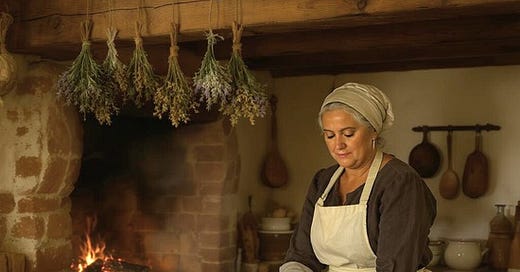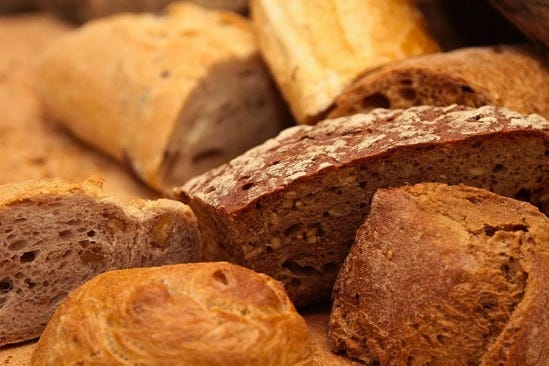Photographic image by Flux-1 Kontext
I imagined a visit with my 2nd great-grandaunt Harriet Allery in her modest cottage in Totnes in the 1870s, a widow reflecting on a life of rural devotion. I was curious!
What was it like to marry at seventeen—were you frightened, excited, or both?
How did you manage a household with so little and still raise three children?
When you go to the Totnes market, what do you look forward to most?
Do you remember a moment in your life when you felt truly proud?
What remedies or cures did your mother teach you that still serve your family?
How did you feel when the railway came through—hopeful, or wary of change?
If you could choose one hymn to be sung at your funeral, which would it be?
What do you miss most about the way things were when you were a child?
Has your faith ever been tested? If so, how did you find your way back?
What do you hope your children remember most about you?
Chapter 2: The Hearth Keeper
Quote: “We made do. I baked, mended, grew herbs in the garden, and stretched everything to the last crumb.”
Managing a household with grit, grace, and precious little. At the heart of the Allery home, Harriett’s bread-making was a ritual—her strong hands coaxing life from flour and water, her patience yielding loaves that would feed her family through the week. Each loaf was a testament to skill, thrift, and care, shaped by the rhythms of rural Devon and the steady warmth of the kitchen hearth.
“My kitchen was never grand, but it was the centre of everything. A single cast iron pot, a scuffed table, and shelves with jars of dried herbs were all I needed to work small miracles. While Samuel saw to the fields, 27 acres of them, I kept the fire going, baked the bread, and patched whatever needed mending. With flour on my apron and soap-roughened hands, I kept our world from unravelling.
Every week I baked loaves in the hearth, patched trousers by lamplight, and hung sprigs of sage and mint to dry near the chimney. Our garden gave us carrots and leeks most years, and I turned them into stews with bones saved and broth stretched thin with barley—and sometimes, prayer. Neighbours came not just for eggs or herbs, but for calm. If a baby had a fever or a cow was calving, someone would knock on my door. I didn’t have much schooling, but I knew what to do. Maybe that was enough. I wasn’t flashy, and I didn’t need to be. My hands knew how to stitch and stir and soothe. And in doing so, I built a home that held more than warmth. It held certainty, care, and comfort.”
Reflection Prompt: Think of someone in your family who held the home together through quiet, everyday acts of care. What memories or values did they pass on through food, chores, or conversation?
Notes on Breadmaking: from Perplexity
Bread Making in a Devon Kitchen, 1830s: Harriett Allery’s Table
Ingredients Harriett Would Have Used:
Coarse or wholemeal wheat flour, likely stone-ground at a local mill, as refined white flour was expensive and less common in rural Devon.
Water, drawn fresh from the well or pump.
A pinch of salt, for flavour and to control fermentation.
A leavening agent: most likely home-cultured yeast (sometimes called “barm,” skimmed from brewing beer or ale) or a sourdough starter passed down through the family. Commercial yeast was not yet widely available.
Occasionally, small amounts of milk, treacle, or lard, if the family could spare them, especially for special loaves.






